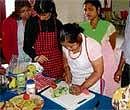
The aroma of freshly-baked cakes and biscuits wafts through the air as Poppy Borgohain

(26) animatedly describes why her golden-brown biscuits with their crusty tops are delightfully soft and flaky inside when one bites into them. Poppy loves baking. She is the happiest when she is in a kitchen working with different ingredients, trying out new recipes and whipping up batches of sweet cookies or crunchy savouries.
Baking is a newfound passion in Poppy’s life, which has witnessed a series of rough patches. Poppy was paralysed on one side of her body when she was only seven, and after she failed to clear her Class 10 examinations, she was really unhappy and clueless about her future. She and her family, particularly her mother Anita, a homemaker, were finding it difficult to come to terms with her disability. Says Anita, “I kept wishing that my daughter could do something worthwhile and be independent. I didn’t want her to sit idle.”
It was at that point that Poppy heard about the one-year vocational training course in catering, housekeeping and food processing being offered at Sishu Sarothi, a centre for the rehabilitation and training of youngsters with multiple disabilities in Guwahati.
Bright future
Supported by the Foundation for Social Transformation (FST) and with a faculty drawn from the Institute of Hotel Management, Catering Technology & Applied Nutrition (IHM) and the North East Hotel Management Institute (NEHMI), the centre is popular among youth with disabilities ranging from polio and cerebral palsy to multiple sclerosis and locomotor dysfunction.
Ever since Poppy and her 10 other classmates — nine of whom are girls — have become familiar with baking, life is, quite literally, light and sweet, much like the oven-fresh goodies they make in class.
And, for most of them baking is something novel because they had never seen an oven until they stepped into ‘Sishu Sarothi’. Now, of course, they can’t imagine their daily routine without it.
Poppy, who moves around with the help of crutches, is enthusiastic about her future. So is her mother, who finds her biscuits tastier than the ones available in the market. Poppy now hopes to find a job at the bakery unit of a big hotel in Guwahati.
Just like Poppy, Silsila Das (20), who is wheelchair-bound, enjoys her baking lessons. She quickly rattles off the names of all the goodies she can bake with ease — cakes, pastries, buns, pizzas, breads and biscuits. “I hope to start my own bakery some day,” she says with a smile.
Rashmi Baruwa, co-ordinator of the project at ‘Sishu Sarothi’, understands the aspirations of girls like Poppy and Silsila. She also realises that although they have the same entitlements as their non-disabled peers, very few of them are able to enjoy equal educational and training opportunities. And, life for a disabled woman is even more challenging. This is why the work being done at ‘Sishu Sarothi’ is so significant.
Orders for X’mas cakes
Rashmi says, “We aim to empower differently-abled girls to become skilled, self-reliant and productive members of society. The programme is meant to bridge the educational divide, multiply opportunities and end discrimination.”
Trainees are taken on a study tour for an on-the-spot demonstration of various sub-sectors of catering technology at IHM. Silsila especially enjoys the practice sessions, where she tries out various goodies like biscuits, breads, cakes and pastries, muffins, buns, pizzas and sandwiches, along with fruit squashes, chutneys, pickles, and more.
“Goodies baked during the practice sessions are sold to in-house staff and the sale proceeds are utilised for purchasing raw materials and ingredients for the practice sessions. We also take orders for parties and meetings and have been delivering them successfully,” she says with a sense of pride. Now they are also looking forward to taking orders for Christmas cakes.
Dealing with a group of differently-abled girls has been a challenging exercise for the instructors as well. Baruwa says, “Our main hurdle is dealing with a group of differently-abled girls with restricted mobility and communication abilities, a weak memory and a low functional activity level. Sometimes, we have to repeat the lessons. But these students have picked up remarkably well.”
Jharna Sinha, an instructor of bakery is a satisfied woman today. “I had earlier conducted classes for homemakers, brides-to-be and busy professionals. But this is a diverse set of students with different sets of disabilities. Some can’t write while some can’t weigh. But they overcome their shortcomings by making a collective effort. I am really happy with their progress,” she says.
Sinha points out that though it might be difficult for some of her students to work in a general bakery they can definitely be good at on-counter selling, documentation, or as entrepreneurs and supervisors. “They have the basic knowledge of the different processes in baking. I am confident that their skills will be appreciated in any baking unit. A bakery is after all a business and profit matters. With knowledge and work comes respect. If a disabled person can work sincerely, they will definitely be an asset in this sector,” she says.
“Some can even opt to make products at home and supply them to the various outlets in hotels and shops. Others can offer baking lessons at home. The opportunities are many and waiting to be tapped,” she adds.
Women’s Feature Service